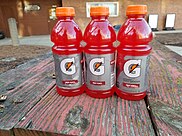Sports drink
Sports drinks, also known as electrolyte drinks, are sold with the claim that they help athletes replace water, electrolytes, and energy before, during, and especially after, training or competition. There isn't good evidence that they help sports and fitness performance.[1]
Consuming too much or in unnecessary circumstances may damage health or performance. The drinks, or some of their ingredients such as sugar, may be bad for some people.[1] Most sports drinks are isotonic, with 4 or 5 heaped teaspoons of sugar per eight ounce (13 and 19 grams per 250ml) serving.[2] Some potentially harmful health effects of drinking sports drinks without prolonged exercise include weight gain, diabetes and damage to the teeth.[3][4][5] These drinks are high in calories and sugar which contribute towards an unhealthy diet.[6]
References
change- ↑ 1.0 1.1 Deborah Cohen (2012). "The truth about sports drinks". BMJ. 345: e4737. doi:10.1136/bmj.e4737. PMID 22810386. S2CID 35181482. Retrieved 29 March 2013.
- ↑ "Impact of sports and energy drinks in athletes for performance based activities". Asian Journal of Multidimensional Research. 10 (10). 2021. ISSN 2278-4853.
- ↑ Schneider, Marcie Beth. "Sports Drinks and Energy Drinks for Children and Adolescents: Are They Appropriate?". publications.aap.org. Retrieved 2022-10-03.
- ↑ Noble, Warden H; Donovan, Terence E; Geissberger, Marc (2011-04-01). "Sports drinks and dental erosion". Journal of the California Dental Association. 39 (4): 233–238. doi:10.1080/19424396.2011.12221890. ISSN 1942-4396. PMID 21675676. S2CID 13102323.
- ↑ von Fraunhofer, J Anthony; Rogers, Matthew M (2005-01-01). "Effects of sports drinks and other beverages on dental enamel". General Dentistry. 53 (1): 28–31. ISSN 0363-6771. PMID 15779219.
- ↑ {{Cite web |last=Schneider |first=Marcie Beth |title=Sports Drinks and Energy Drinks for Children and Adolescents: Are They Appropriate? |url=https://publications.aap.org//ExternalLoginResponse.ashx? Milk may be just as good, or better.<ref>Russo, Isabella, et al. "Systematic literature review: The effect of dairy milk on markers of recovery optimisation in response to endurance exercise." International Journal of Sports Science (2019): 69-85.



